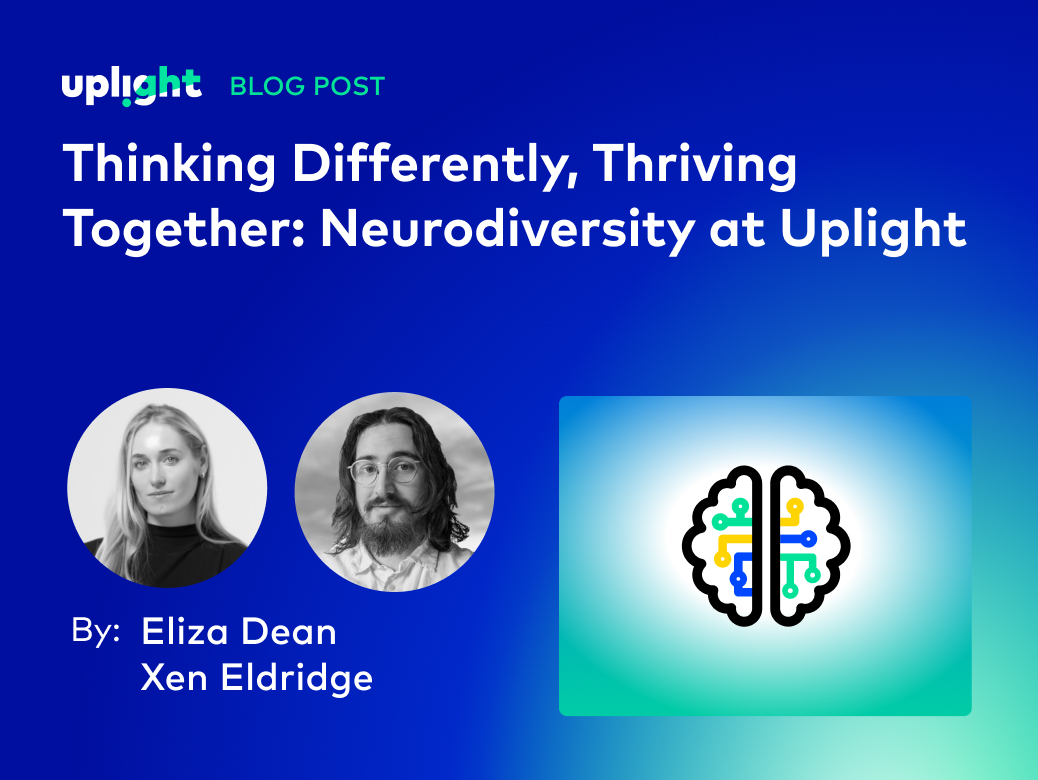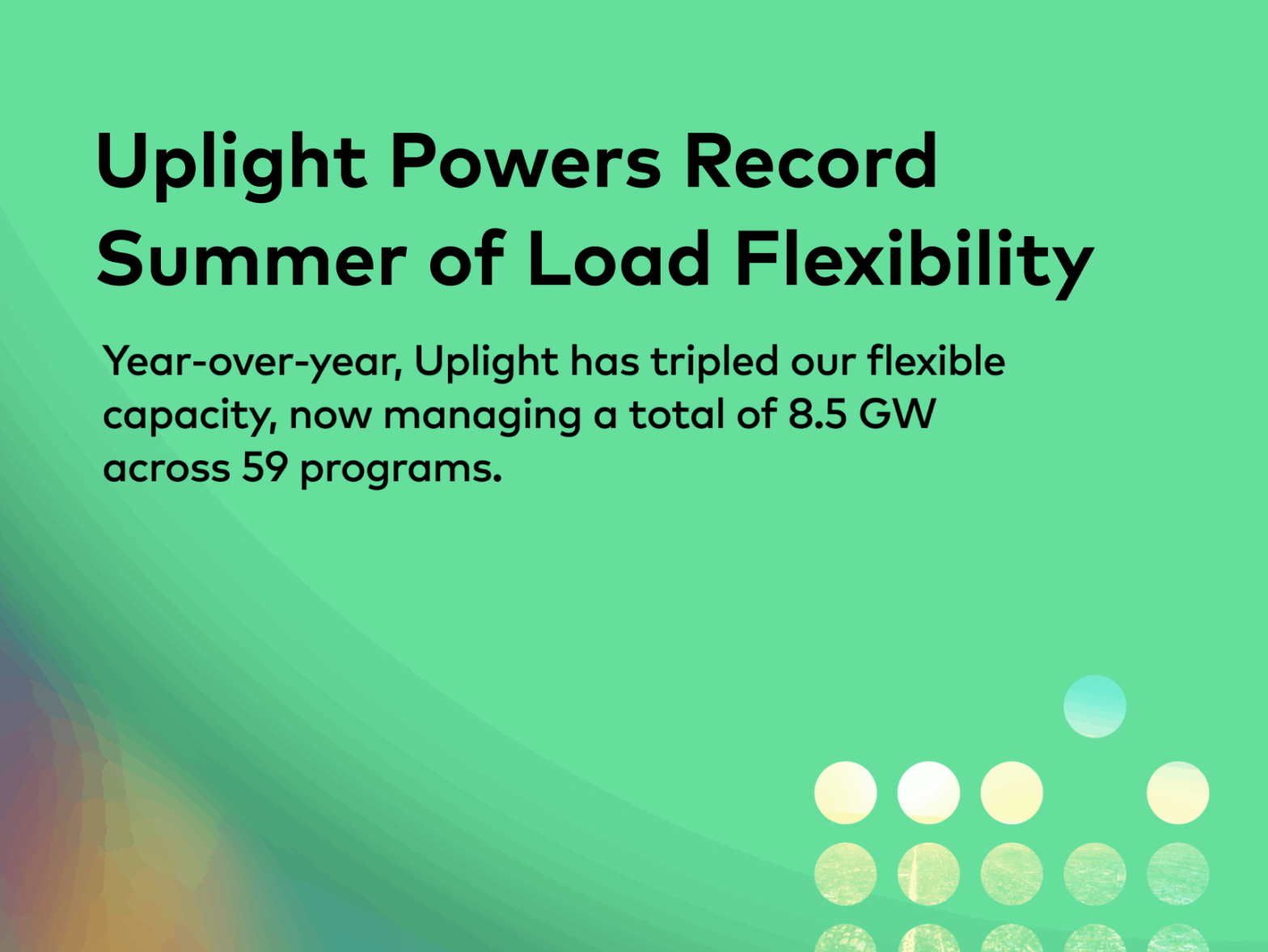At Uplight, nearly 12% of employees self-identify as neurodivergent: this includes conditions like dyslexia, ADHD, autism, and more. Our Neurodiversity Employee Resource Group (ERG) supports employees whose brains develop or work differently from what is typically considered “neurotypical”. The ERG has grown from around 20 members in 2022 to a community of 43 employees and allies today.
Hear from Uplighters, including Eliza Dean and Xen Eldridge, about their experiences with neurodiversity. They will share how it has impacted them personally and professionally, the strengths it has armed them with in the workplace, what they wish their co-workers knew, and their advice for fostering a workplace that values diverse ways of thinking.
When did you first come to understand that your way of thinking was different, or that you were neurodivergent? How did that realization impact your professional life and your self-perception?
Xen: A friend in high school pointed out that people who didn’t know me thought I was sarcastic all the time, and it was shocking to me. That’s when I started to notice my own habit of masking because I started to be more intentional about how I came across to other people while trying to be more aware of my own behavior. Then, around 2021 during the COVID-19 pandemic, I noticed that my experience of taking in overwhelm was different. I processed what was happening in the world and coped with it differently than the people around me. Getting a diagnosis gave me a chance to develop tools to better understand myself and connect with others.
Eliza: I first realized that my brain worked differently in third grade, when my class was learning to read. Despite being excited to learn, I struggled to pick up reading skills the way my classmates did. My parents and teachers noticed and sought answers, leading to a diagnosis of dyslexia after testing with a psychotherapist. It was both unsettling and a relief—unsettling because I didn’t fully understand what it meant, but a relief because I finally had an explanation for my challenges. Back then, school often felt overwhelming. Teachers frequently told me to “just work harder,” but no matter how much effort I put in, I struggled to keep up. I needed more time to process lessons and assignments, which left me feeling behind and frustrated. Socially, it was stressful—I often dreaded going to school, worried that I might fall further behind my peers, and my confidence in the classroom suffered.
With support from my parents, teachers, and a dedicated tutor, I began to find a path forward. Tutoring taught me strategies to understand and retain material in ways that worked for me. Over time, I learned to be patient with myself, and apply the techniques that fit my learning style. Gradually, I became a confident student and strong reader.
What specific neurodivergent trait or way of thinking do you believe is your greatest professional asset?
Xen: I’ve learned to recognize that everyone thinks differently. Navigating the world and creating empathetic solutions across the company has required me to develop unique skills. I now operate from the mindset that “just because it makes sense to me, it doesn’t mean others will arrive at the same understanding.” Over time, and with a lot of help and patience, this has been essential in shaping my communication style.
Eliza: I believe my greatest professional asset as a neurodiverse individual is a strong growth mindset. I understand that success often comes through trying, failing, and iterating until I improve. While some tasks come naturally, I’ve learned to give myself the time, patience, and resources to work through challenges in areas that don’t. Most importantly, I’ve embraced challenges rather than fearing them, turning obstacles into opportunities for growth.
Being neurodiverse has also taught me the importance of self-advocacy—knowing how to ask for help and who to turn to when I don’t understand something. This skill comes from years of explaining how I think and learn, and it allows me to collaborate effectively and seek the support I need to succeed.
What do you wish more people (both in management and among colleagues) understood about neurodiversity in the workplace?
Xen: Most people understand that diversity of background strengthens any group, but it can be harder to see neurodiversity in the same way. The skills I’ve built to manage overwhelming situations have given me a unique way of processing information, which gives me a lens of awareness I think could benefit others I work with. For instance, my experience has made me passionate about creating accessible solutions, such as designing software that helps people with disabilities or different ways of thinking access information. Features like meeting transcripts and recordings, for example, are great because they don’t just help a single group; they give everyone a way to review information and stay on the same page.
Eliza: I think more people should understand that neurodiversity shapes not just what someone can do, but how they approach challenges and see solutions. Different ways of thinking often reveal patterns or opportunities that others might overlook—something neurodiverse individuals often have a particular knack for spotting. This pattern recognition can help teams identify inefficiencies, anticipate potential problems, and connect ideas across projects in ways that aren’t immediately obvious. Recognizing and valuing these differences—and providing space for them—can turn individual strengths into a collective advantage for the team, enabling more innovative and effective problem-solving
How has Uplight’s commitment to creating a supportive and inclusive culture impacted your experience as a neurodivergent individual?
Sara Saavedra (she/her)
Neurodiversity ERG Leader and Senior Manager, Demand Generation
Uplight’s commitment has made a real difference. It’s encouraging to see that the company recognizes people process information and work in different ways, and actively looks for ways to make things more inclusive and accessible. Through this ERG, Uplight has enhanced employee communication through spelling out acronyms on slides and providing recordings, notes, and slide decks after large company meetings—allowing me to absorb information in the format that works best for me. I have also been able (and encouraged) to set time aside for focus, which helps me stay productive and work more effectively. I appreciate that Uplight goes beyond supporting neurodivergent individuals, but truly values and celebrates us.
What advice would you give to other companies looking to foster an environment where diversity of thought is valued and encouraged, leading to greater innovation?
Cindy Schweitzer (she/her)
Neurodiversity ERG Sponsor and Senior Vice President of Sales
Fostering diversity of thought starts with psychological safety, where people feel comfortable sharing perspectives and leaders listen with curiosity. It also requires building diverse teams intentionally and creating space for all voices to be heard in discussions and decisions. Finally, encouraging experimentation and learning from missteps shows that input matters and drives innovation.
Building a Workplace that Supports Diverse Ways of Thinking
When employees bring different problem-solving approaches, ways of processing information, and perspectives to complex challenges, the entire organization benefits.
Uplight’s Neurodiversity ERG provides a safe, supportive space for Neurodiverse employees and allies to connect, share ideas, and drive meaningful impact. By designing inclusive practices—such as clearer meeting documentation and flexible work formats—the ERG is helping support diverse ways of thinking, while improving outcomes for all employees.




